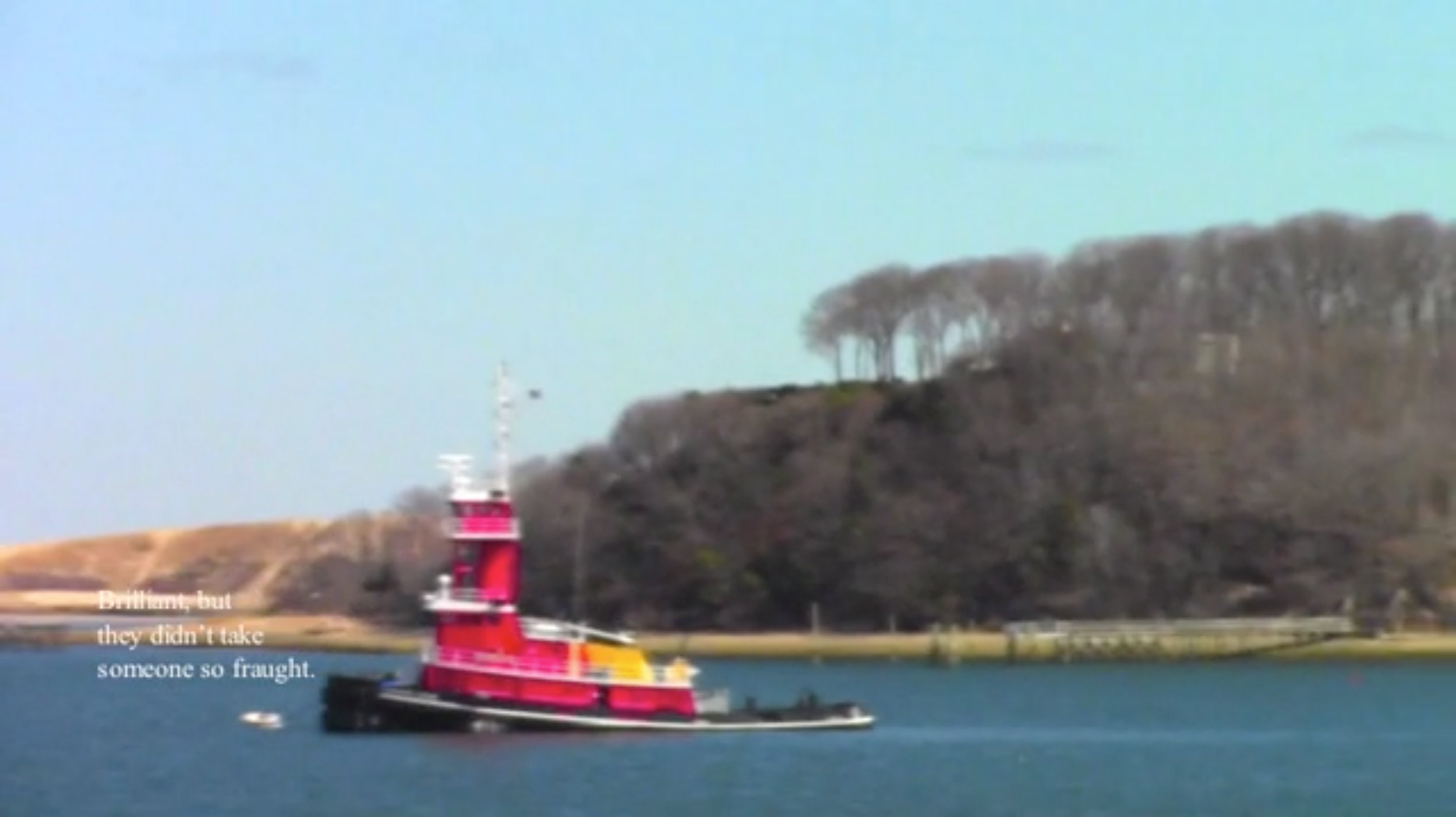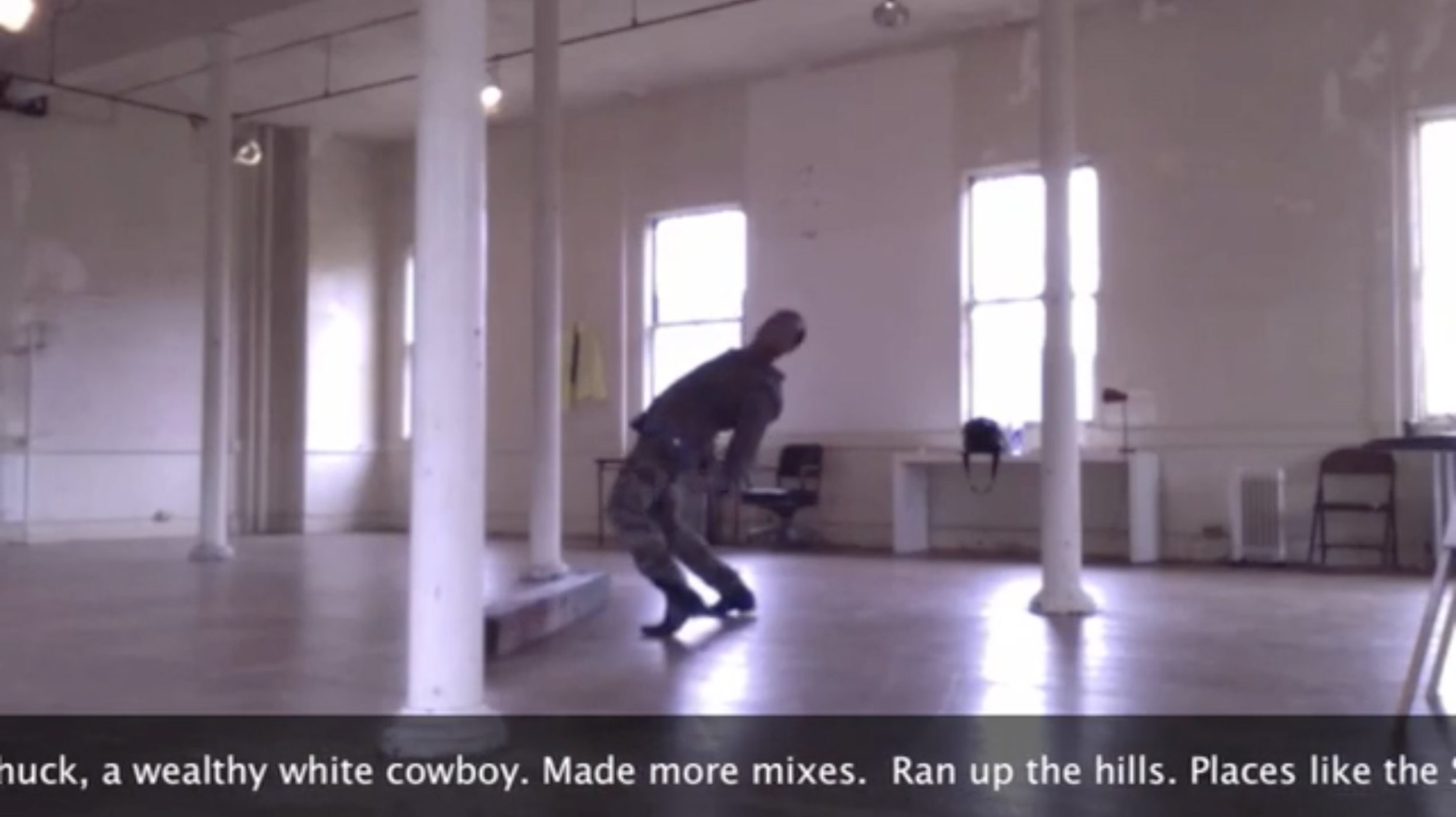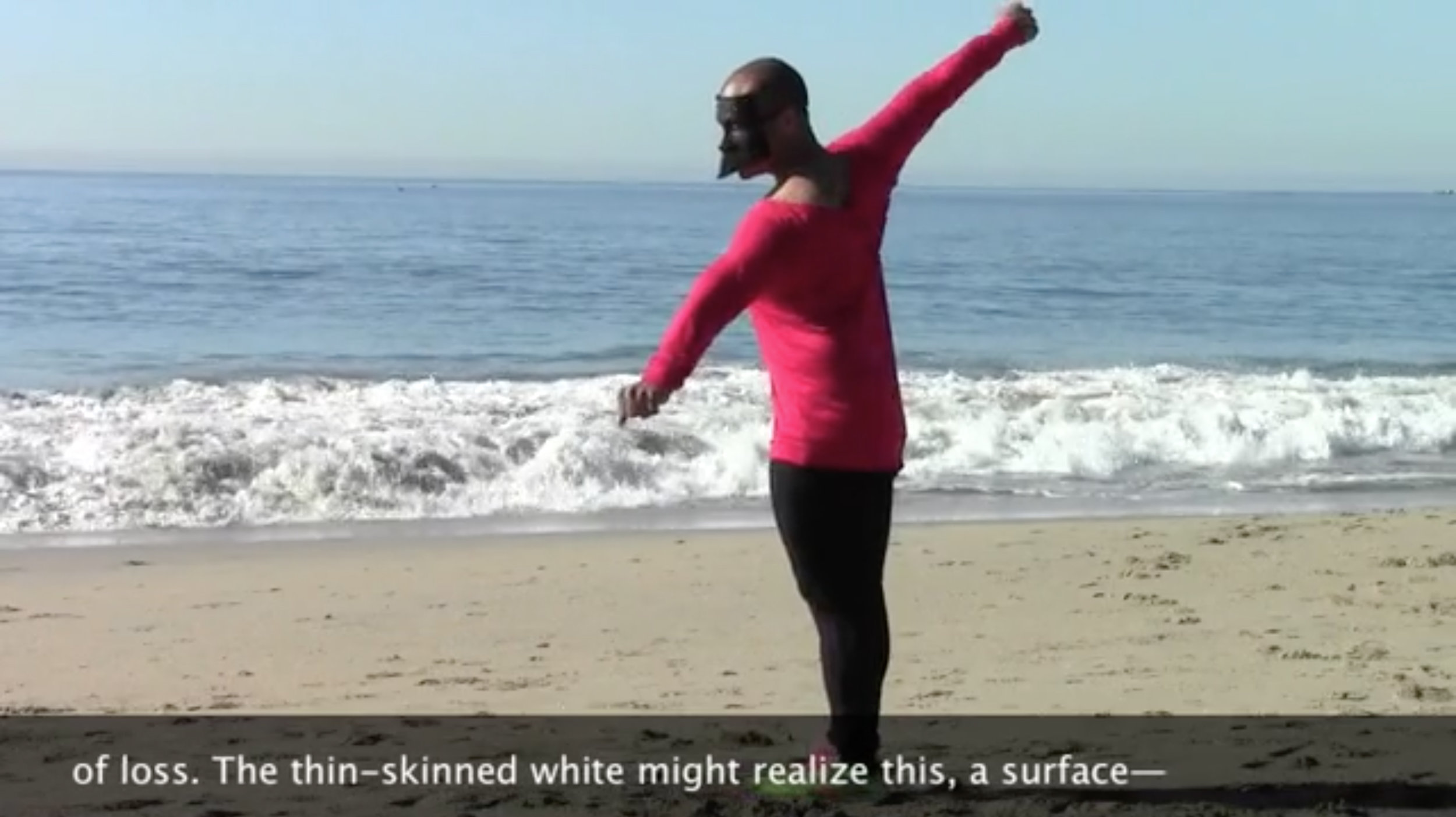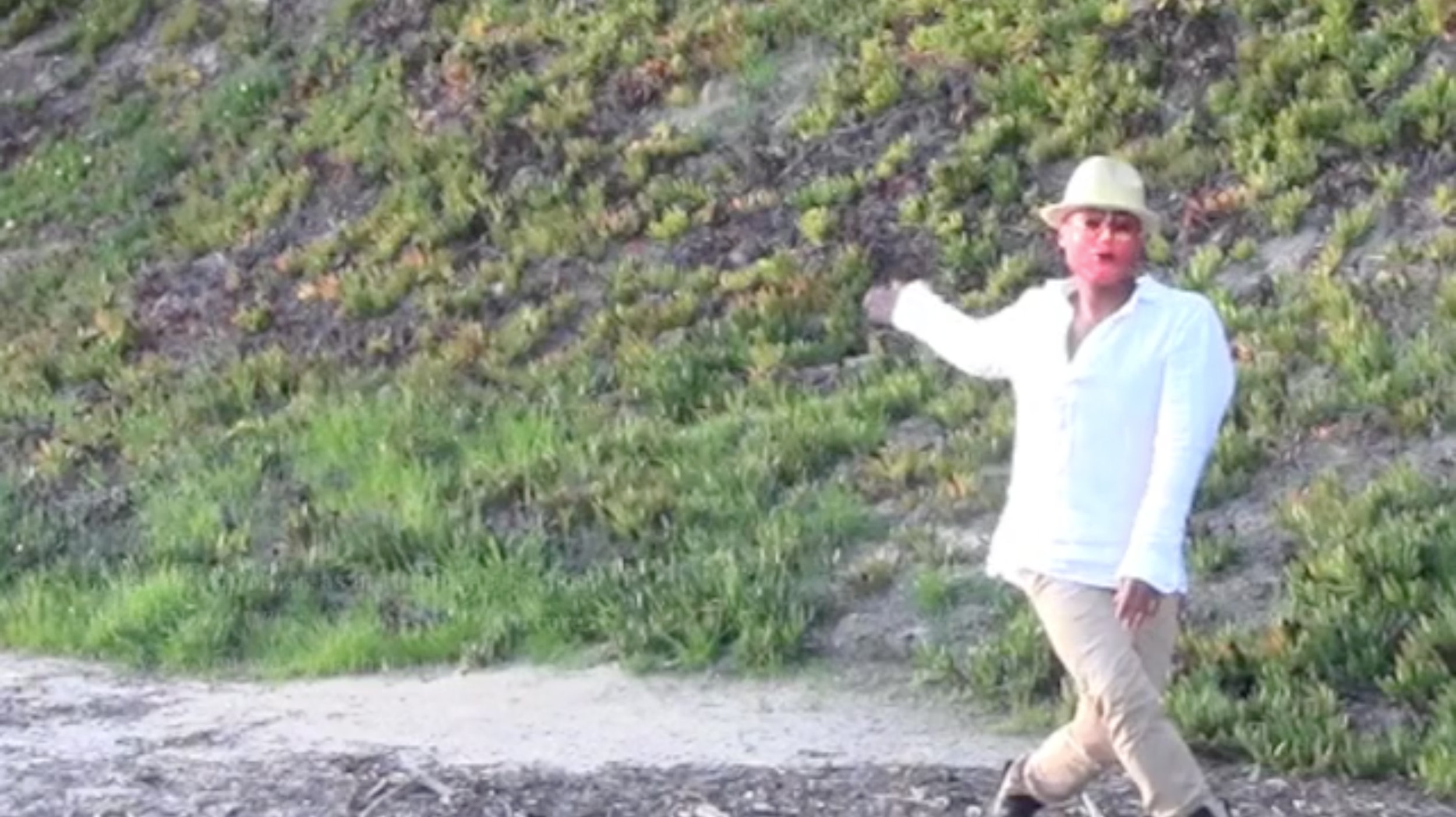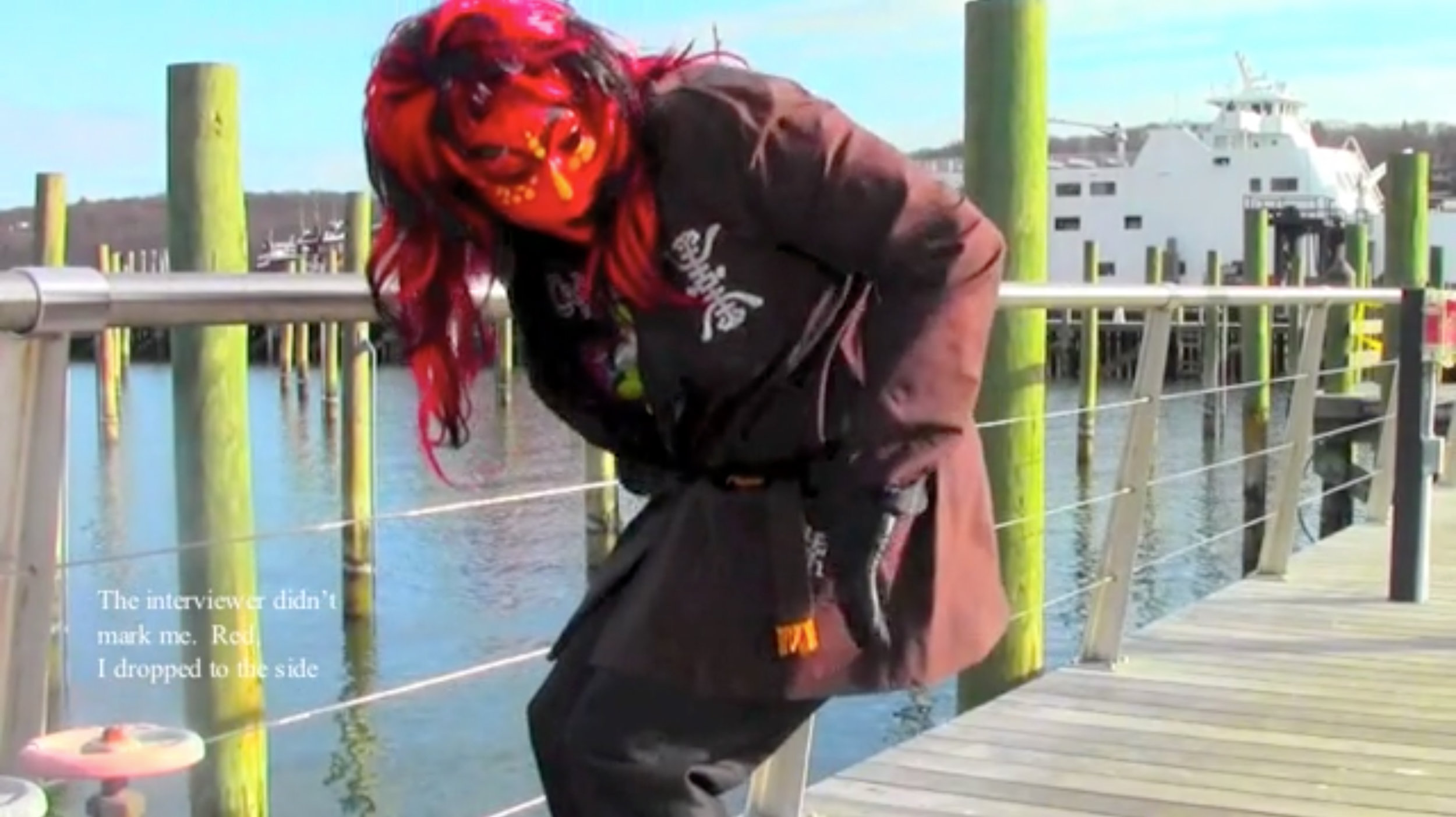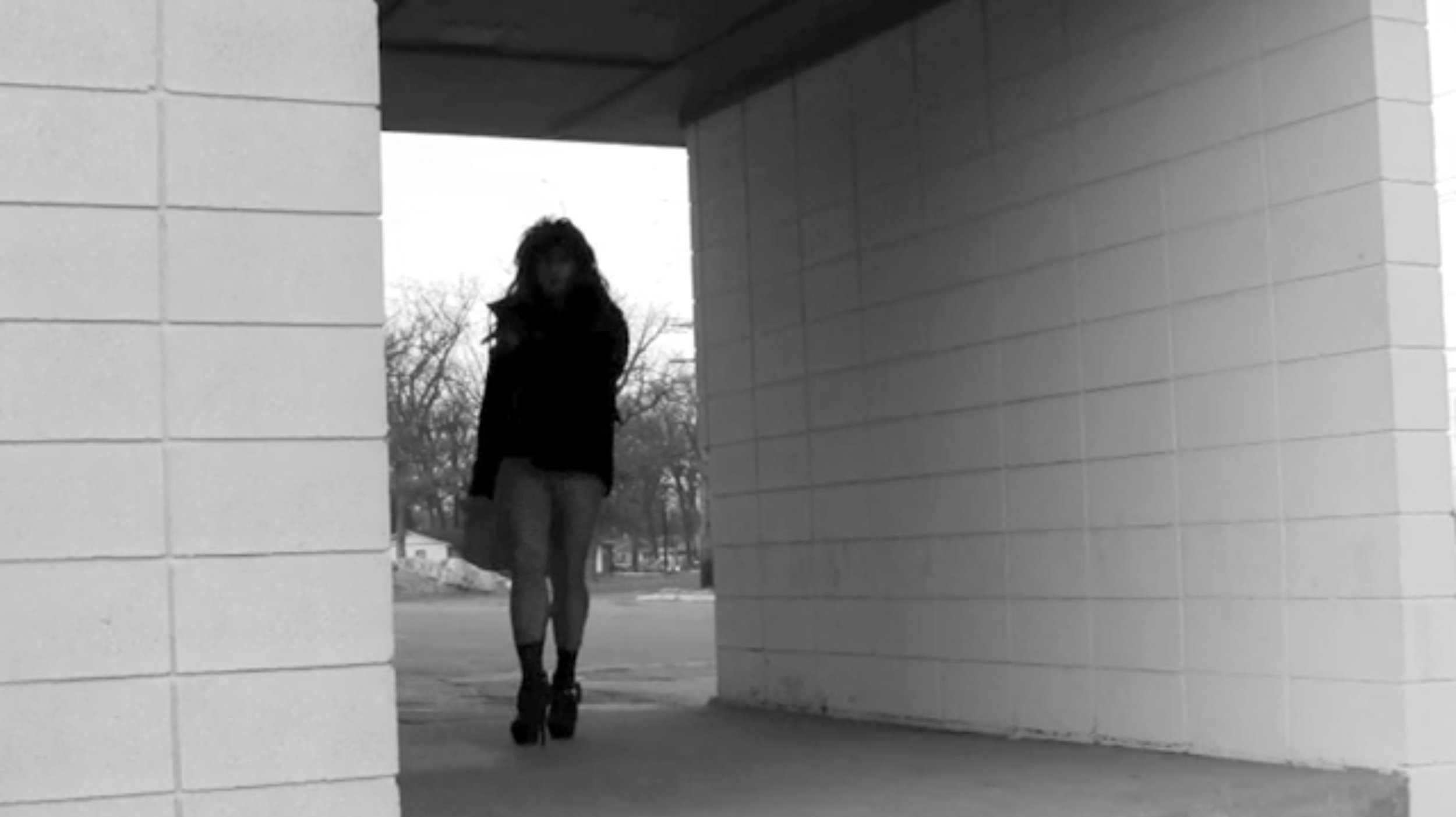Color Series
Mixed Media, Poetry, Video, Essais
Feb. 2014 – April 2014
Center for Art and Thought, CA
I was horsing around with a bunch of young white boy poets. Maybe I was one of them. They liked junk food, and we were messing around, trying to beat a vending machine out of what it held, or all of us were getting what we paid for by kicking it. From the beating, it tumbled out bag after bag of snacks, including fresh popped popcorn that shot from the fallen glass, and Cheetos spilled all over the place, too, but it was the popcorn that thickened the landscape, layers of it all upon the front yard, a scalloped lawn, each of its long landings doused.
This would happen just before the snow fell.
Down in the basement, there were two camel crickets, one a black “teen” that bounced around, and escaped, and the other, an older insect that leapt in several directions, trying to get away, but it didn’t think to hide under the worn Williams-Sonoma bag I hold my wet yoga gear in before I dump it in the wash.
The older one got smashed on the dotted tile.1
I begin with these two narratives, one dream-fictive, the other a chance encounter in the old house where I sometimes live. Both narratives represent an accumulation, or a marked abundance in the loss of subject and subjectivity, maybe my own, and the realization that what I am attempting to record about race and its manifestations, its epiphanies, as well as its discontents, floods out of the most innocuous places: dreams, journal entries, notes, revisions, basement run-ins—in each iteration, and my attempts at its capture, I am engaged in performing against solidity, expectation, against a black-static self.
A lot of the time, my expectations, in the midst of these performances, are given over to a pressing sense of whiteness as an overwhelming subject that moves around the body of what I want to say, a feeling, a source that encounters me at the same registers which I attempt to make sense of, or to at least hold in view, recognize, and to play around in. At this point, there is nothing perfect I can say beyond the realm of intuition, corralling around the sensations of what seeps in, and how this leads to a meditative stance around race and my relationship to thinking, being in the middle of it, blackness, as a site of intervention that includes dichotomies, splits, and then right when I go upstairs, some black and white little animal I barely see, a cat I don’t know, enters the house when I am upstairs printing out my flight itinerary.
When they say “nice dimples,” perhaps they’re really speaking about my teeth, which, after about a week of slipping the plastic over their surface, and after the stinging gums, the eyes reddening, I am, after all, recognizable. As who knows what: a friendly flyer, moving in the plane down the aisle, safely away from the cockpit, ever becoming someone or something, known.
I am suspiciously, yet fully, alive, unthreatened and singular but amidst all the others being marked in the flow of a number of related constructs: visitor, traveler, assailant, voice, spy, dancer, walking into and past that reactive moment as I attempt to wrestle with whom I am playing with, in the space between self-fashioning and experiment.
How to focus on the matters of making up this self, from the hyperbolic to the broken apart, and what are the possibilities found between breaking and singing, risking the too high music, or kick, the off pitch, the teeth bared to speak into erasure, to play with stereotype, capture, captivity, slippage, obliteration?
During a performance, when I am dancing, I let my spine drop down on the stage, or I push it down, so I can lift my entire body into moving in and out of time and space with whatever comes to meet it. I do not rise. I elevate in language that comes through the body. Where and how am I flexible around those that stand in the way, those that shock and rip us apart, and those that can be found, and sometimes used? How am I recognized in collaboration with the person I am believed to be and the person that plays between objectification and self-construction?
Frantz Fanon in Black Skin, White Masks explores a condition that helps me to frame the space in which this oscillates. He writes: “In the white world the man of color encounters difficulties in the development of his bodily schema. Consciousness of the body is solely a negating activity. It is a third-person consciousness. The body is surrounded by an atmosphere of certain uncertainty.”2
Who are the players in this relationship, and what are the ways that this relationship, as a condition, marks the self, surrounded by this certain uncertainty? Does this stance call for offense in the face of offense? And what might be possible in the space of the shifting and permeable modes of defense? In other words, how do I/we write poetry in response to the need to experiment, to engage with the space outside of the poem, the space outside of the self in the midst of our offensive and defensive strategies in complicating one’s artistic performed practice and identity? Is the need to experiment between poetry and its multiply imagined forms dependent on embracing the status quo, the avant-garde, research, intuition, institution, absorbing all, inverting all, perverting all, via realms of pleasure, play, satisfaction, release?
But there are dead ends that count. There are trespassings, invitations, and ways into negotiating multiple relationships that might resemble something more or less civilized, like having a community, a post, a research fund, travel allowance, books, a nice home, a hot car, but the long leash that keeps you as not always aware of the figurations of the features of your psychic condition binds one to working with, or wanting to, or having to destroy the foundations upon which these connections are maintained.
As one might surmise, I often think about the split between the self and the speaker, in the space of the poem, as in the arena between the speaker and the persona and the self, or for that matter, the fractured body as metaphor, the thinking self constructed as the poem, the self moving, and the perceived self maneuvering against the wishes of the perceiver in the field of communication.
Some of the questions I am interested in encountering are as follows: What are the relationships between the poem/sound/dance/video and their various performances, and how will playing in and pushing the boundaries of each meet and complicate questions of race, sexuality, and representation? In particular, what does it mean to be working in received and self-articulated formations of race: African-American, Black, Asian, Filipino, Queer, Mixed, Re-mixed, Sublime, Surface, Jet, Swallow, Baby, Nap, Scream – And in terms of various imports, written, drawn, painted, performed, what will turn out to be the primary documents of this experience: the book, dance, sound-scape, film, or all of the above?
As of late, I frequently make sound recordings, fresh, improvised spoken documents, in and as various soundscapes. Speaking, moving and being with my voice in and with the world, constitutes an artistic practice I consider to be the poem, and poetry. The self, forming, that creates this is only loosely the “I,” or the “me” speaking, and this self speaking is not caught up in the din of silence, or usual routes of the poem’s expectations.
I describe these recordings as, “original poetry captured on my iPhone, documented while jogging on the beach, walking streets, hiking forests, driving, dancing, practicing yoga, sitting in cafés, or restaurants,” and bars, where I often go “off the dome,” and “go in” as it were, on my surroundings as an artist.3
Adrian Piper helps me to further synthesize this where she points out that: “…the artist per se, as a social and aesthetic being with a vocational role defined in relation to the rest of society, is determined not by the agency of anyone else but by the broader and more subtle spectrum of undeterminable forces.”4 Funny enough, I often find myself making my recordings at sites of opulence, consuming the perfect Pinot Grigio, grilled Monterey Bay calamari. In Sausalito, sitting out, staring out at the water: Who sees what? Who enjoys what? Who goes in, and where?
I do. Once, while making one of these recordings in a tiny Italian restaurant in Capitola, I was busted by a woman who saw me talking about her and her husband, on the attack, how she was in the way, the bane of my desire to wreck their home and make that Old White Daddy mine. To absorb him. To which she may have heard and asked, “are you videoing me?” I did not answer. Sometimes the inquisitor is invisible, or the speaker is absent, and the exchange of silence, or that sort of silence can get one through untouched, safe, unmarked, in any case otherwise, even more fully aware and alive, still at play.
Simultaneously, I am at work, finishing a new collection, Lucy 72 , a series of prose poems, first rendered at an artist colony where I spent much of the month drafting seventy-two poems written in long, loosely structured couplets that helped to address my thinking through the initial work.5 These poems, now honed down, but still in couplets, reveal a fluid narrative perspective that explores race, sexuality and representation both within the field of my imagination and, simultaneously, in my observations and analyses of my experiences in the artists’ colony in which these poems were written – as well as in others – where this exploration becomes further complicated and enriched.
When I attend most artist residencies, I am usually the “only one” by many criteria, often the only attending African American, certainly the only African-Filipino American. Add to this Queer, and add to that, I am often one of a few, or the only full time academic cultural critics. And then add that I work as a multi-media artist in painting, video, sound, dance and performance art. By all measures, I am usually an anomaly in these mostly, or all white, straight, and traditionally single medium centered artist colonies.
It is a challenging experience to thrive in these environments, as the “only one,” subtly or not so subtly attacked with various degrees of intention and frequency. At a recent residency, during dinner, it was suggested that I be “strangled” for describing the super thin, wealthy, post-plastic surgery white women in a nearby neighborhood as somehow longing to vanish. Later, I was called an “asshole” for naming an art colonist’s entitlement and white privilege in bypassing the colony’s bureaucracy in claiming the largest, nicest room of our communal house that was not intended specifically for her, simply because she felt it was. Another night, after sharing my experiences and ideas with some visiting artists about creating art work in public environments, restaurants, bars, airport lounges, etc., I was told that if I tried to do this in the major city where they lived, I would be “shut down,” and that I “talk a big game.” Clearly, I couldn’t be telling the truth, and besides, Who do I think I am?
Lucy, via her poetic personae, speaks outside of her perceived race, or is complicit in her race as a white woman, a white woman who is also a fat brown young man, or not black, or shapes, sometimes becoming a flash of light, meditating on people, rocks, playing in rivers, skies, staring into beige walls, fans, or low grass.
Part imaginative landscape and real field report, the poems in Lucy 72 expand around the core of what it might mean to be “the only one,” to not be shut down, but to open up into reflection, to evade strangling, and to breathe. I attempt to capture the person, beyond name-calling, who speaks through race, sexuality and representation, circulating in and out of the spaces where Lucy lives, and where we do too.
25. LUCY AND THE SUN
Of course, I don’t fear it. I look up into its face and see myself.
The bright not melting or burning, but leading me into the shiny stone,
flat and red, striped with white streaks that flow on its top.
It doesn’t overheat, more than it keeps me safe from my body, not bone,
but warm. A black wouldn’t see me without a rack. Billiard balls nest
in a triangle, so am I soft in my heart? I wait where I was born,
I break, softly, as if lying on a plate. Shell, I’m not sure
I will ever be hard. Whites, I am raw. Even where my body cramps,
I wonder what it means to be half and half? I can feel the black coming.
I enter a code, pull myself through a tiny room, dart away, my sight.
27. LUCY AND MOVEMENT
My body is full, while a black is a fragment.
I will not dream beyond texture, nor long for a sea;
instead, the field of grass thick as a substance
pulls itself out of the fire, holding the body alight
like a locket that forced itself open – the self,
shocked against the exit of the self?
In the opening, piles of leaves are not there
to shake and gather against my brain.
In the night they have left, and I’m all numb.
I, looking at a leaf, lying on a black surface,
I, pushing my speech forward as one act –
the first slip of my own body into the night.
My motivation, the next, the whole of my back
arching forward, to reveal this:
There is my body, and there is his.
Two iron poles shoot dark and hard, some crust
formed between us, where the sea air gives way
to the red mountain trail, to the rip
of the brown tide. Feeling, and looking
out over the coast, knowing, why is he so black?
40. LUCY CONSUMES WITH INTENT
The tree beyond the screen is not flat, and through the green,
I make my sight blur in the metal grid.
It keeps out the gnats. A branch cradles up above the fat trunk
and the moss spots are thick in the sill of memory.
Blur, I’m not brown, nor do I glow, but a part of my want
is attached to my breath, which I hold close to the grass line
as if my arms reach out above the yellowing leaf. To suck light,
I hide beneath the grey bird that will drown if it nicks the sea.
A spider web weaves beneath the two cracks that arc,
like I don’t have a belly? I’d rather not eat than be black.
The flamingos grow pink with algae. A black runs in a forest.
He’s a male, 5’7”, 176 lbs., and muscled.
To DAS EFX, he dances in the street. Or a black in my brain –
he does a typical jig, or imagines himself red as a college mascot,
dead self-tossed in the dryer. If I walk, am I lost in the auburn updo,
or if my hair’s caught where I sink, will each bite bulge my lips?











